Chapter One - Samos
~for Majida~
Introduction.
This is a true story about some of my experiences working with refugees on the edge of Europe in 2017.
Set in Vathy, the capital of Samos which was one of five Aegean Islands to have Reception and Identification Centres (RICs) better known as refugee camps, established by the EU under a “Hotspot” strategy in 2015.
This policy made the first country a refugee arrived in responsible for processing their asylum application. While they were processed they lived in these camps where living conditions were extremely bad, many were held in these terrible places for 2 or 3 years.
These are the people in this story.
Refugees who were residents of the camp:-
Fawaz The Philosopher, an ex Syrian Army tank commander, then ISIS captive who escaped and somehow got to Samos.
Najam, Ali and Mohammed, cousins from Irbil in Iraq in their 20s.
A Syrian man whose name I didn’t know.
Community volunteers - refugees who helped in and around the camp with volunteer groups. In this case they all worked with Samos Volunteers (SV). Some lived in the camp others outside:-
Elias a young Syrian Christian who before the war worked as cabin crew on Syrian Air. He lived in the house of an elderly local woman and helped her with chores and shopping.
Jonathan who spoke excellent French, English and many African languages. A charismatic young man, he had played for his national youth soccer team before leaving Burundi.
Majida, a Syrian Muslim in her 30s who had been a successful photo journalist before the civil war. She had worked in Egypt, Jordan and Dubai for a social media company but was in Syria during the carnage that destroyed her country and made her a refugee. She is one of the kindest and most positive people I know and she inspired this story, which is dedicated to her.
International Volunteers who worked with Samos Volunteers:-
There were many from all over the world, mostly young women. Only four, all men, are part of this story.
Gareth a young New Yorker.
Greg a 30 something Englishman.
Bradut a Romanian in his late 20s, the lead coordinator of Samos Volunteers.
Me, a then 63 year old semi retired businessman from Shropshire UK with no previous experience of humanitarian work.
Of course there were many other people, the camp had around 2,000 residents in early 2017 and the population grew every month during the year. There were lots of different SV volunteers plus the camp employees and officials, police and army personnel etc. but these were the ones involved in this story.
This account is from my first ten months as a volunteer in Greece, a member of the European Union since 1981 and theoretically a first world country. A lot of details, daily incidents and experiences have been omitted and some names have been changed.
This video from 2016 gives an idea of the crisis facing Samos at the time:-
This video quotes a figure of 60 million displaced people in the World. In the last nine years that number has more than doubled and there is nothing to indicate that trend will change.
Part one.
The first few months.
I started work with Samos Volunteers in the Spring of 2017. To begin with most volunteers spent a lot of time sorting clothes in a warehouse 2kms from the camp but gradually we were trusted with tasks that brought us into contact with the refugees. SV was the only international volunteer group at that point in the history of the camp, though some big NGOs like Medicins Sans Frontieres were also there.
MSF supported SV in their activities, financially and with camp access. In those days you didn't need to be registered in Greece, it was still fairly informal and we had no premises of our own, just the loan of others like the warehouse which belonged to the Municipality. The Paradise Hotel lent us meeting and teaching space and most short term volunteers stayed there. We also had a couple of rented houses the younger volunteers shared. Everyone paid for their accommodation and all their own food and travel. It was very much a “grass roots” organisation.
Our main activities were helping with new arrivals, distribution of clothes and blankets, serving hot tea to the breakfast queue, socialising, language classes, sports and games, schooling and play for the children.
One of the first activities I was involved in was helping set up chess and other board games on the old olive grove just outside the camp entrance. We met every day at 4pm, sat on tarpaulins on the floor and played chess, draughts or backgammon with camp residents for an hour or so. Dozens of kids joined in so a play group was started to entertain them, organised by Elias who was great at playing with the children and inventing new games.
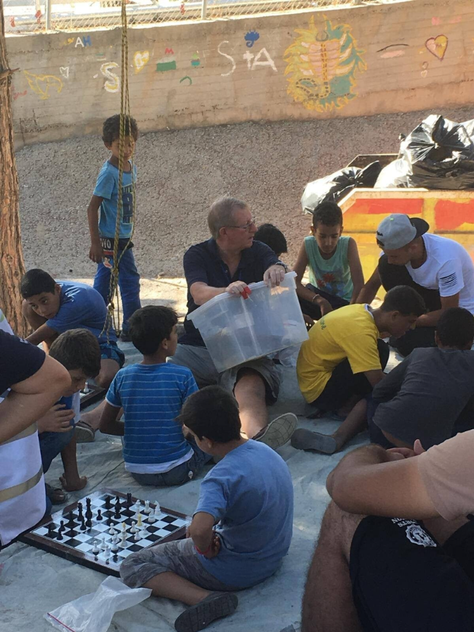
Surrounded by children until Elias rescued me!
New arrivals were bussed into the camp from wherever they landed and held in a small fenced area like a wire cage till their fingerprints and details were taken. They arrived in the night from Turkey on inflatable boats that carried up to 50 people. Like Lesvos, which is the island thousands of Syrians came through in 2015, Samos is very close to Turkey. It's only a couple of kilometres across the straits though the boats usually set off further up the coast.
They were only allowed to carry a small backpack so refugees arrived with their phones, personal papers and little else. Most waded ashore, some swam, occasionally a boat foundered and they didn't all make it. Their clothes were usually wet and salty and they were thirsty and very nervous when they arrived.
Around 40% of residents in the Greek camps are children. They usually arrived dry as their parents carried them above the water. Medical cases were taken care of by the professionals.
By the time new arrivals had been picked up and brought to the camp it was early to mid morning but sometimes they arrived in the middle of the night. We took it in turns to be on call for new arrival duty which meant going into the cage with water and dry clothes.
There was a complex of portacabins in the middle of the camp near the reception area and SV shared one of the cabins. They were used for office space, food and other distributions like diapers and baby formula and surrounded by a wire fence which created an enclosed walkway around them. We mainly used ours for morning tea, served to the breakfast queue from a window as they filed past. We also kept some clothes there for the new arrivals.
It was during my second week that I found our volunteer coordinator Jasmine on her hands and knees in tears of frustration trying to sort out suitable clothes for forty wet refugees who had just arrived. Surely this could be better organised?
A couple of us approached the SV lead co ordinator Bradut (he was the boss) with a simple idea that involved spending some money, which was in very short supply at the time. We had a warehouse full of donated clothes being continually sorted but could we afford to buy stuff for some pre prepared packs just for new arrivals? The warehouse had everything from mini skirts to mink stoles but very few trousers or track suits and most new arrivals were wet to the waist.
Bradut agreed so we bought track suit trousers from the local Chinese shop along with underwear, socks and vests and those slip-on flip flops - sliders. We made up new arrival packs with four items in a roll wrapped with masking tape marked M or F and size. Stock in the cabin with reserve supplies in the warehouse and all sizes of sliders. New volunteers weren’t let loose on the refugees till the coordination team got to know them so this simple job helped them feel more useful during their probationary days in the warehouse. And hopefully there would be no more tears trying to find clothes for lots of new arrivals.
Every 6/8 weeks or so I went home to check on my businesses then went straight back. I was committed to helping, I couldn't believe the conditions the people lived in and the way they were treated. The camps were supposedly well funded but somehow the money sent to Greece by the EU was never reflected in the housing, equipment or quality of food. It was shameful for people to live like this in Europe. We were certain the conditions were deliberately kept this way to deter more from coming.
After my first trip home I went to work in the warehouse where a new American volunteer explained in great detail how I was to prepare new arrival packs. The ethos of all volunteer groups was egalitarian but whenever I went away I got a new boss who'd just arrived when I got back. The young American was Gareth from New York. To be fair - I was probably worse at his age.
One of my regular jobs was serving the breakfast tea. We had 3 large urns, enough for hundreds of the small cups we handed out. To optimise our capacity we used half of one urn then topped it up, half the 2nd one, topped that up then all of no 3, by which time no 1 was hot again. Breakfast was collected from 8 o'clock around the corner from our window so the people were queuing by about 7.30. MSF paid for the teabags and sugar.
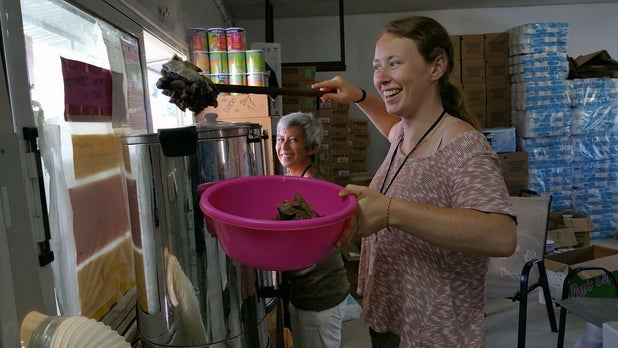
Volunteers making tea.
Lots of residents had basic cooking facilities so they didn't all come for breakfast or tea.
I was often the first outsider in the camp at 7 o’clock to fill the urns. If the tap in the cabin was dry, which it often was, we had to take buckets to a standpipe by some dreadful toilets nearby. The smell from these toilets was awful and the stench of human sewage hung over the whole camp. The toilets were single portable cubicles like the ones used for music festivals and events and their contents were sucked out by a contraption that looked like a giant Henry hoover, which leaked as it was towed around the camp. There were overflowing rubbish skips and litter everywhere and there was a serious rodent problem in the camp.
As the residents knew we were getting water for their tea they always helped and let us jump the queue for the tap. Everyone queued for everything every day. Queuing was how they spent a lot of their time.
We couldn't fill the urns the afternoon before as another organisation used the cabin then and we couldn't use more urns as the power supply tripped. Sometimes the power was out all morning so the camp residents had their breakfast without a hot drink.
Breakfast mainly consisted of a very cheap croissant with an equally cheap carton of orange juice, basically it was sugar masquerading as food. But it wasn't as bad as lunch and dinner which resembled something you might feed to chickens - or perhaps something you'd already eaten.
I had a camp breakfast sometimes but wouldn't touch anything else. The food was prepared off site by a private contractor, probably a relative of someone in camp management, and delivered in undated takeaway containers. One day I was shown purple rice covered in black mould and another time lentils in some sort of gravy with dozens of maggots swimming around. At least breakfast usually had a piece of fruit with it.
We limited sugar to two spoons a cup, which caused many complaints, and started buying lemons to add to the tea to introduce more flavour and some vitamin C into their diet.
It was serving tea where we first met The Philosopher.
Every morning Fawaz brought herbs he'd collected from the woods on the hillside. He always had herbs in his own tea and brought enough for us and others. His herbs and the slices of lemon were a great improvement.
He always had something interesting and philosophical to say and that's how Fawaz got his nickname, which he was immensely pleased with.
It's also how I heard his story. How his group lost a fire fight with ISIS and how he surrendered as the only survivor. How he escaped and much more, so much more that if I didn't cut short his storytelling I'd get nothing else done that day.
He was one of hundreds in the breakfast queue but stood out with his quirky stories and slightly paranoid tales of the persecution of his religious group. He was adamant Zionist conspirators would never him be given asylum in Europe. I had no idea what he was talking about but he was right about the end result for him, he wasn’t allowed to remain in Greece and was eventually deported to Turkey.
It was through Fawaz The Philosopher that I was introduced to what later became one of my main activities - prison visiting.
On one of my first trips home I arranged a fund raiser at a local pub for Samos Volunteers and collected over £700. Ian Mitchell, a sailing friend, came up for the night to sing and play guitar and promised to arrange a similar but much better event, which he did, raising £5,000. Others were fund raising around the world. It was time to step up and get our own premises.
We opened the Alpha Centre, the first community centre for refugees on Samos in the summer of 2017.
I was always a keen sailor and have owned several sailing boats, the one I had then was in Lefkada in Western Greece so I took time out to move her to Samos. I couldn't keep staying in the Paradise Hotel and was going to need the tools I kept on the boat.
I'm not a tradesman and my friends who are would have laughed at my efforts, but I was better with my hands than most of the younger volunteers. We had quite a decent building now in a great location between the camp and the town, it was perfect for a community centre but needed lots of improvements - so we got to work.
Greg Oke, a sound engineer and film producer arrived for a couple of months and we started off by converting the big dirty basement into a welcoming mother and child space. Assisted by Jonathan and several others from the camp, Greg and I were the cowboy builders of Samos Volunteers - we wore stetsons to prove it.
Here’s a video of the cowboys at work:-
Helped by Jonathan, Steve Smith, Toffee, Joel and many others - all supervised by Natalia
Greg's contribution and lasting legacy for the group was publishing a cookery book -
Displaced Dishes - refugee recipes that found their way to Samos - it's still available and the profits go to SV
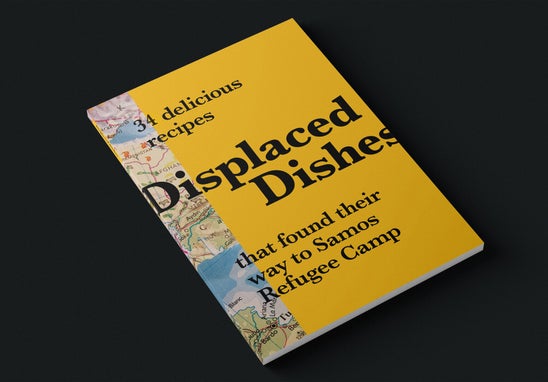
https://displaceddishes.com/product/the-book-en/
Jonathan and I kept bumping into each other on different jobs and we appeared together in a photo for the SV Xmas message that year with another Burundian, Adams. The photo may have had a touch of white saviorism about it?
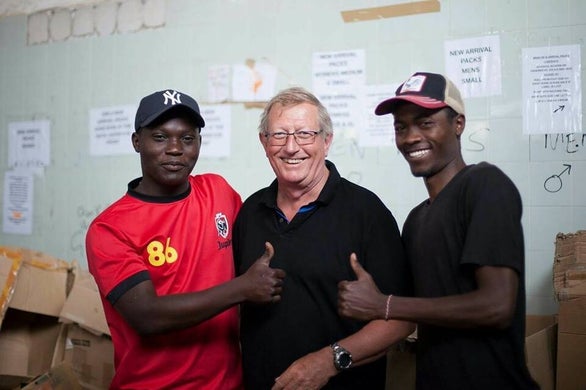
Left to right - Jonathan, me and Adams
Jonathan did great stuff with SV then moved to Lesvos (where I went next) and worked as a translator with MSF's trauma clinic. Not an easy job spending all day translating for people who've been injured, cruelly imprisoned or tortured.
Najam and his cousins were regular visitors from the beginning and he started helping me with jobs. Building shelves and cupboards, creating a basic kitchen and generally fixing stuff. Whenever he finished queueing for whatever he was queuing for he would find me and start helping. He was always cheerful and smiling. He smiled more than anyone I've ever known. I'm sure he was very amused by my amateur construction efforts.
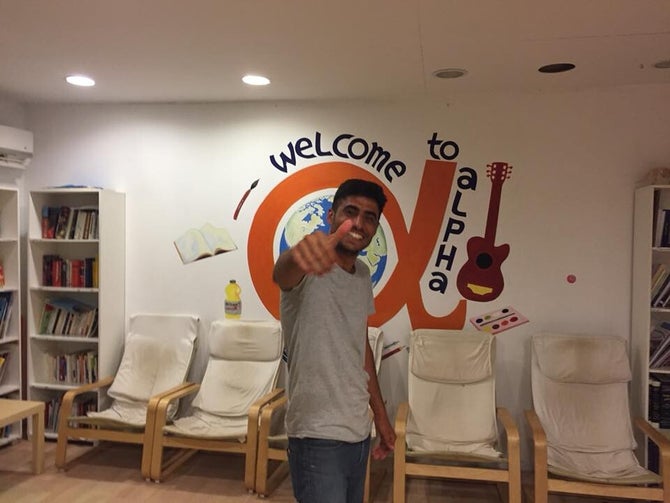
Najam at The Alpha Centre
One afternoon, while playing chess at the old olive grove, there was a commotion in the woods on the hillside above.
A man was attempting to hang himself from the branch of a tree. Greg and Elias were the first to reach him but I was too slow so watched as they took his weight, relaxed the rope around his neck and got him down onto the ground.
Being in or around the camp was always quite stressful for me. In those days I smoked small cigars, nearly always wanting one as we left the camp. That day I was obviously more stressed than usual, I'd never seen anyone try to hang themselves before. I lit up as we packed away, offering a cigar to the people we'd played chess with. A quiet Syrian man accepted and I gave him a light.
Majida, like Jonathan, was very active and involved in lots of things. Teaching volunteers Arabic and refugees English, she cooked for small celebrations, translated for Dr. Manos who helped camp residents and had her own pop up tea and coffee service - Majida's Kitchen - which she opened most evenings just inside the camp. Occasionally I helped her.
It was very different to morning tea where we served a long queue from a window. She used a small area in one of the portacabins to prepare the hot drinks then brought them outside in thermos jugs. Mingling and chatting while pouring the drinks was much more sociable, though she didn't have as many customers as we did at breakfast.
As the camp population grew we started to run out of tea in the mornings and were having to close the window on expectant but then resigned faces. People rarely got upset or aggressive, they passively accepted their new lives of constant queuing and waiting for a decision that, if they were lucky, might open the way to a new, safe and secure future.
I've heard and read so much about how refugees or illegal immigrants want to take advantage of the free benefits and idle lives that settling in Europe promises. But the reality is the vast majority just wanted to find work and be able to support their families in a safe place and to live a life with self respect and dignity.
A few days after the attempted hanging the quiet Syrian man from chess joined us for evening coffee. He spoke good English and during a break while Majida refilled the thermos jugs we sat together on a low bench made from pallets. I offered him a cigar while we talked. He held the pack and asked how much they cost? Six euros I replied. “Look at what my life has become” he said “I can't even buy a pack of these.”
I didn't ask him what he meant about his life, the only rule I try to follow very strictly is based on the principle of Do No Harm.
Our role was to listen but not ask questions or pry into people's experiences. Whenever you did it risked triggering bad memories. I was once involved in teaching English to refugees and one of them asked me about my family in a group discussion, so I explained my situation then unthinkingly asked about his. The young man then told us all how many of his brothers and sisters he had lost and how they died.
Lay volunteers aren't trained counsellors so the basic rule is listen - but don't ask.
When Majida came back with fresh coffee I started to get up. The quiet man put his hand on my arm and asked me to stay and I said I'd be back once we'd served more coffee, but he left soon afterwards.
I felt guilty about cutting short our conversation and sorry for him not being able to afford a small luxury. I decided to buy a fresh packet of 20 cigars in the morning and offer them round as usual after chess, then I would give him the rest of the pack. It's not a gift if it's already open is it?
Favouritism and giving gifts was against the rules, though of course we all had favourites and all bent some of the rules. The selection of community volunteers was the most obvious favouritism. They were always the brightest with the best English and were nearly all good looking young men.
Lot's of chemistry between International and Community volunteers led to relationships that were supposed to be taboo. In my four years volunteering in Greece I saw many relationships between female volunteers and male refugees but, despite the scandals over sexual favours expected by charity workers in other countries, none between male volunteers and female refugees.
The Syrian man I bought the cigars for wasn't at chess that afternoon but as we were about to pack up several policemen ran down the road from the gate shouting. My quiet new friend was led back to the camp a few minutes later, his was the second suicide attempt that week.
If I'd been more experienced or confident I would have tried to help him and followed the police into the camp to see what happened. Instead I did nothing as they took him away.
At the time the authorities offered refugees the opportunity to self deport with a cash incentive of €500. I was told later that in the case of attempted suicide there was a standard procedure. The person was sedated, “signed” the self deportation papers and sent back to Turkey with €500 shoved in their pocket, though knowing the level of corruption I don't suppose many actually got the €500. Such a waste for these two guys whose attempts were so obviously cries for help.
I didn't see the man again and never knew his name.
And - I never ever cut short a conversation with a refugee again, even if it meant I had to listen to The Philosopher telling me his strange but occasionally wonderful stories all afternoon.
As for the police? They weren't all bad. During a hot and short staffed new arrival distribution one helped us pass out the water bottles. Then he went home to fetch some of his own family's clothes for the children. There was always some kindness amongst the indifference and casual cruelty of camp life.
A few days after the quiet Syrian attempted to kill himself Fawaz, whose asylum application had been rejected twice, was arrested by the police.
Part 2.
Prison visiting.
When refugees arrived they were issued with ID papers, the colour of the paper and the stamps on it signified their status within the system. If you were rejected, appealed and rejected again your papers showed your “2nd rejected” status. At this stage you were in limbo, not a refugee being processed or a visitor entitled to be there any other legal way. The application process wasn't connected to anything else, whether you were accepted or rejected you just walked back out onto the street.
The police could ask to see your papers at any time and if you were 2nd rejected they could arrest and detain you for three months without any other process or judicial oversight. What was so bizarre about this was that many successfully appealed after 2nd. rejection and were accepted. I never understood this crazy system.
Detention involved being kept in a holding cell in the local police station. They were using a dimly lit room about 10mts square in the main station in Vathy which had no natural light with only one toilet and sink. This cell was used to hold up to forty people but fortunately for Fawaz it was already full and he was sent to Karlovasi further up the coast.
I went to the camp to collect his possessions and took them to Karlovasi then visited him twice a week till he was released three months later.
His cell was like something from a Western movie, all bars with three or four people lying or sitting on single beds with a sink and toilet in the corner. The only good thing about being detained was the food was better in prison than in the camp.
Visits were about chatting, taking fruit or small treats and cigarettes, something to read and making sure he had credit on his phone, which he was allowed to have for a short time each day. Visitors could sit near the bars but no hand shaking or other contact was allowed. You couldn't pass them anything yourself as everything had to be checked. The police were ok but occasionally they were bad tempered or had other stuff going on and refused to let us see him. As far as I know Fawaz wasn't treated badly.
Najam kept helping out, always smiling. We even managed to hang a door that actually worked on a crooked frame instead of making the frame straight. Not sure if I could do that again.
One morning he was later than usual, not from queuing but dealing with news from home. Najam had worked as a driver in an oil installation and ISIS “persuaded” workers to help extract crude into trucks to sell. They partly financed themselves with money from black market oil.
The news from home was that his mother and father had been visited and badly hurt as the ISIS guys tried to locate Najam to work for them. They didn't believe his parents when they said he'd left the country and tried to beat the truth out of them.
I came across something similar the following year on Lesvos. An Iraqi man in the camp with his family was working with us as a community volunteer. One of the small benefits they got for helping was a fortnightly laundry of their clothes and bedding. But this man brought clothes every couple of days and insisted on having them washed. He was such a nuisance the group fired him.
I checked with the Afghan woman who looked after the laundry room and she said the clothes he brought always smelt of urine. I took her word for it, after all - before the Taliban murdered her husband and she fled with her son she had been a doctor.
It turns out the man’s daughter, who was sixteen by then, had been taken hostage by ISIS when she was twelve to make her father work for them. The sexual abuse she suffered had left her incontinent.
Some friends and I made sure the family had sufficient adult diapers for her till they were transferred to the mainland a couple of months later. It was the best we could do for them.
A few weeks after the incident with his parents Najam was very late again. A bombing in the market of his home town had killed around sixty people including more than a dozen of his extended family.
It was recorded by the Iraq Body Count Project that after being “liberated” by the US, supported by the UK and others, that between 2003 and 2017 there were at least 180,000 civilian deaths due to violence in Iraq.
The violence continues today but thankfully the number of people killed is getting smaller, nowadays it’s “only” four or five hundred a year.
As I continually edit and rewrite this story I hear on the news this week that Tony Blair is being considered as a future Governor of Gaza. This is such an obscene idea it makes me feel physically sick.
Meanwhile the camp was getting busier. New arrivals outnumbered those processed and transferred to the mainland and they were running out of space.
The camp was built on a hill and arranged in terraces of portacabins and isoboxes. Cabins for offices or supplies, boxes for the people.
An isobox is basically a converted 20foot shipping container with a tiny bathroom in the middle and a room on either side. Two families or 8 individuals per box was the usual arrangement. If that sounds cramped it was, but at least it was dry. The capacity of all the fixed accommodation in the camp was around 800, the rest of the people lived in tents or shelters made from wood, plastic sheets or corrugated iron.
By late Summer the space within the camp’s perimeter fence was full with many tents set up between the terraces and boxes, new arrivals were being sent out onto the hillside and tents were starting to appear around the edge of the olive grove.
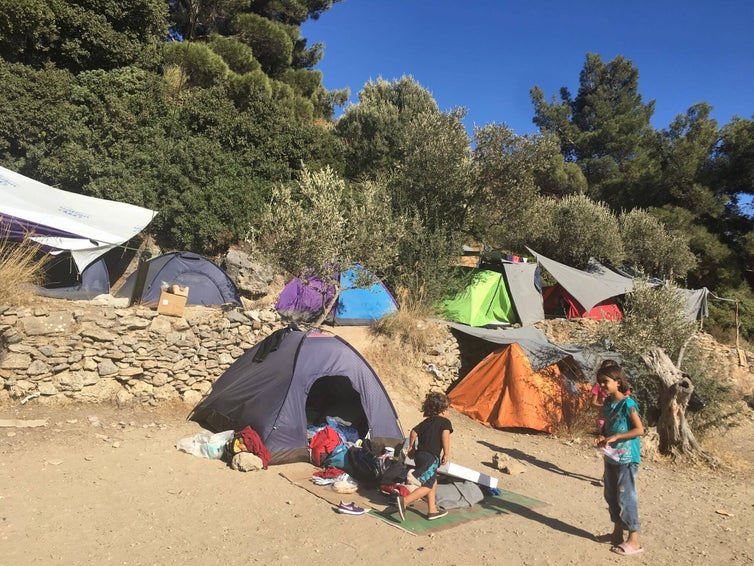
This looks fine in the sunshine but was pretty grim in the winter.
This video was first posted when I was on Lesvos but had actually been filmed earlier in Vathy camp. It doesn't make any difference - conditions were about the same in both places.
Sometimes pallets were put down first with the tent pitched on top. This helped prevent rainwater from flooding the tent. Unfortunately it also made a good place for the rats to live.
There weren’t always enough tents for the new arrivals.
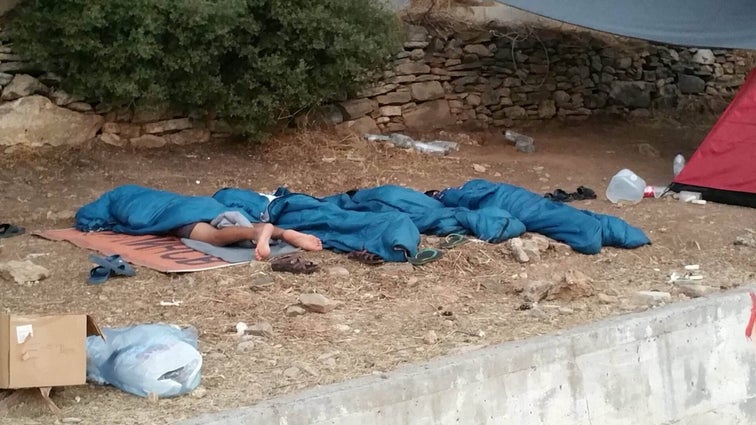
Sometimes new arrivals spent their first few days without shelter.
I made another trip home and when I got back Elias, who also had 2nd rejected status, had been arrested.
All the young volunteers were going to a beach party 10 minutes drive from town. Gareth was driving one of our small hire cars overloaded with six passengers, all international volunteers apart from Elias. Stopped by the police they checked his papers and took him away, they never spotted the volunteer in the boot of the car.
Why they didn't make two trips to the party I'll never know, it was only a bloody party. Gareth seemed unfazed and unrepentant, I was furious with his stupidity.
Elias was held for three months in the Vathy lockup. With barely enough space to lie down and no daylight, the only window was inside in a tiny room just off the cell, built for lawyers visiting their clients.
One of the SV co-ordinators tried to visit him everyday but didn't usually succeed. I was pretty sure her persistence annoyed the police. I went with other volunteers once a week and we were sometimes allowed to speak to him through the glass. From there we could hear the sound of screaming coming from the cell - people slowly going mad.
Before locking refugees up in the main police station they used a cell behind the customs office on the quayside. I had been there one day when four refugees were led out of the building. Handcuffed and chained together at the waist and ankles they shuffled, emaciated and blinking into the daylight. Who knows what was happening in these places.
Elias was fortunate, he wasn't treated badly and the police asked him to help with translating. During his third month some of the policemen would let him out of the cell to sit with us.
His biggest problem, apart from being innocent of any crime (except of course that he was a refugee) and being locked in a dark, filthy room with forty other people, was toothache.
I was seeing a dentist at the time and explained about Elias. He offered to treat him and check on any others if he was allowed into the jail. Obviously any treatment would be limited to the equipment he could carry.
So I went to the police station and asked if the dentist could be allowed to visit. I was taken to meet the Inspector in charge who said he would email Athens about the request and was told to return a week later.
On the day I was to go for an answer Najam and his cousins were arrested.
As the camp got busier with new arrivals and there were more families with children it needed to be reorganised. A terrace housing single men was going to be used for families. It was late Autumn by then and getting cooler and wetter. Winter, which is really cold and stormy in the Aegean, was approaching. The winter storms bring torrential rainfall which makes living in a tent insufferable.
Najam, Ali and Mohammed were ordered out of their isobox and told to camp in the woods. When they protested the police were called in and they were taken to the station in Vathy.
At the Alpha Centre we heard what happened to them by early afternoon. At 4 o'clock I had my appointment to discuss the dentist's visit so went to the police station and an officer showed me to the Inspector's room.
On the way we passed Najam and his cousins on a bench in a corridor. Their wrists were cable tied behind their backs and their upper arms were bound, they were like trussed poultry with their heads between their knees. I told my escort that I knew them and asked to speak to them but he pushed me along the corridor and they didn't look up.
The Inspector informed me the request for access for the dentist was denied. Also, not to make any more attempts to talk to prisoners.
Najam told me after they were released that later that night the three of them were taken to a room where they were badly beaten.
As Vathy was full they were sent off to police stations around the island. Najam was held in Marathacampos, a village miles from Vathy in the middle of the island and we did our best to visit every week. The policemen were ok and they liked him. His tiny cell for one had a solid steel door with a small barred window high up, he gripped the bars and stood on tiptoe to talk to us, smiling as usual.
I didn’t know Ali and Mohammed as well as Najam and was very busy so didn't visit them as often, something I regretted later.
Although their detention had nothing to do with 2nd. rejection they were all held for three months, once again without any court procedures. The police appeared to be able to do whatever they liked.
One afternoon, after he'd been in prison for more than three months, Elias was told he was free to go. The first we knew of his release was when he arrived at the olive grove where we were setting out games. Seeing him play with the children brought tears to my eyes. After we packed away we went to see the dentist and I paid the bill for his treatment.
The following evening Bradut arranged a welcome home reception for Elias. Stupid speeches with Elias having to walk across the room to Bradut for a handshake and presentation gift. Being the boss seemed to be going to his head. After relationships with a string of female volunteers Bradut had finally settled on a young German woman. Some of us were pretty sure he didn't actually like the refugees and humanitarian work wasn't his main reason for being there.
A week or so later I was driving with Majida to the airport to say goodbye to a volunteer leaving the island and we talked about how unjust it was that Elias had been detained in prison.
I already knew some of her story from the Syrian civil war. Cities divided and ruled by different groups, checkpoints everywhere and communities fighting on different sides. Assad's army, backed by Putin, barrel bombing civilians from Russian helicopters and using chlorine gas to clear people hiding in cellars during the siege of Aleppo.
Apart from using Syria to fight proxy wars with the West (the USA), Russia had a strategic interest in the country.
Between Northern Lebanon and Turkey lies a stretch of Syrian coastline, the country’s only access to the sea. The ports of Latakia and Tartouse are in the homeland of the Alawite tribe and the Assad family are Alawites. These are the only ports in the Mediterranean the Russian navy has access to so they've always supported the Assads.
The United Nations has recorded dozens of occasions when chemical weapons were used by the Assad regime during the civil war, Sarin as well as Chlorine.
While these atrocities happened the UK welcomed Russian money - we sold football teams, businesses and swanky London properties to Putin's cronies while he helped Assad murder his own people.
Boris Johnson even appointed the son of a KGB man to the House of Lords. We only objected to Putin’s behavior when he invaded Ukraine.
It seems to be the view of America, and therefore her allies, that Arab lives don’t matter as much as white ones. Look at what is happening in Palestine today.
A civil war has to be the worst type of conflict and it took Majida eighteen months to cross her country to the Turkish border. Known to be a journalist she spent a lot of that time imprisoned and interrogated by different groups fighting in the war.
Of Elias’ experience she had this to say -
“Yes, what happened was awful, but at least he didn't have the beating or the electricity or the rape.”
I asked her which of those she'd had and Majida replied very quietly “All of them, but I am happy now.”
Her words almost broke my heart.
Part three.
The final months in Samos.
Volunteer life went on - tea in the morning, fixing shelves, making and painting blackboards, playing chess, visiting people in prison and listening to Fawaz’s incredible stories as he was free by then.
I was also having discussions with lawyers in London as well as Vathy and the refugees I knew who had been detained by the police. In addition to the the arbitrary detention the conditions in Vathy amounted to torture: no daylight, overcrowded, no exercise or fresh air etc. and a local Human Rights lawyer Dimitris Choulis had offered to take a pro bono case against the Greek Government to the European Court of Human Rights.
I spoke with all the refugees I knew who had been arrested and held and all were very angry at first and wanted to give statements, but by the time they had been out for a few weeks they changed their minds and just wanted to concentrate on their asylum applications. Although their identities would have been confidential they were scared to get involved. They somehow came to accept their incarceration as part of their journey.
I was promoted and made responsible for cash and carry shopping with a card and account paid by MSF. On one shopping trip I bought ham sandwiches by mistake as part of a packed lunch for a group of boys being taken on an excursion. Whether they knew the meat was from a pig didn't seem to matter, they ate the lot before leaving the building.
Scabies was widespread in the camp and MSF proposed to finance installation of a laundry for SV to run for them. As the mites and their eggs get into clothes and bedding these have to be hot washed and dried to kill the scabies otherwise it's straight back after treatment. Of course in the camp conditions it was impossible to get rid of altogether. Scabies inevitably came back and continued to spread.
Setting up the laundry was to be my responsibility but before the project started I decided to move to Lesvos where Moria RIC was the worst refugee camp in Europe with nearly 9,000 residents, rising to 23,000 three years later.
I joined One Happy Family, a Swiss volunteer group running the biggest community centre for refugees in Europe in early 2018. It wasn't perfect but was in a different league to SV.
In 2019 I set up a new NGO, The Lava Project (TLP), with the help of OHF and seed finance from the UK charity Help Refugees, now renamed Choose Love. At TLP we ran a laundry in a small industrial unit in Moria village near the camp. Over time we bought and installed commercial machines with sufficient capacity to wash, dry and heat treat the equivalent of 200 domestic washing machines in a ten hour working day.
We worked with MSF and other clinics on scabies treatment in the camp and when fully commissioned helped treat around 30/40 individuals a day. Not so many when you consider that of the thousands of residents half the people had scabies with 40% of the camp and patients being children. Though those 30/40 people did bring a lot of bags of washing.
We did other work too with vulnerable groups, washing clothes for the unaccompanied minors, bedding for unaccompanied children and everything for single mothers with babies. There were at the time 60-80 children without parents in the Safe Zone and about 120 single mothers in the Protected Area of the camp.
People often asked me how they came to be refugees when pregnant, not understanding most of the women had been raped or paid a smuggler, policeman or border guard with sex during their journey. None of them knew the fathers of their babies.
MSF treated the most severe cases of scabies amongst families and Kitrinos, a British NGO, treated the single men. Whole families including babies with scabies is pretty grim, but that's for another story.
I worked in Lesvos helping support the people of Moria camp until the outbreak of Covid in March 2020.
What happened to my refugee friends from Samos?
Najam now lives in Derby in the UK and works as a welder. We met for coffee last year as I wanted to hear about his life since Samos. As usual he smiled all the time we talked.
His cousin Ali lives and works in Scotland and Mohammed went back to Iraq after arranging for the political offences he was accused of to be dropped. I suspect bribery may have been involved?
Jonathan lives in Crete, still working in the refugee business he is married to a Greek girl and they've started a family. He recently sent a photo of him with his baby boy.
Elias is in Germany helping to run a chain of coffee shops, also with a partner and young child.
Majida has Irish residency and lives and works in a beautiful town in Donegal. She is single, happy and surrounded by good friends. She risked returning to Syria recently, possibly for the last time.
Here is Majida with my dog Bushi in Derry this summer:-
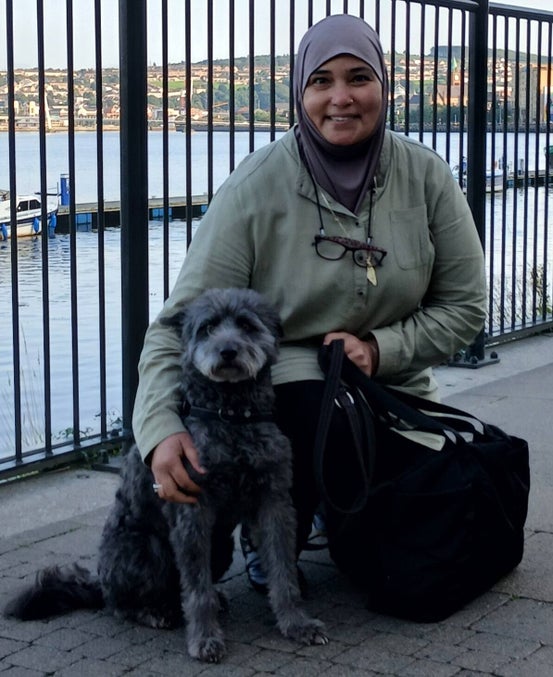
Fawaz the Philosopher wasn't successful in his asylum application and was sent back to Turkey. He spent a couple of years working illegally in real estate sales in Istanbul before being forced to leave. He offered to sell me an apartment but I gently declined his proposal. While in Istanbul he bought and sort of learnt to play a lute, his singing is almost as strange and wonderful as his stories, it really is impossible to describe.
After he left Istanbul he moved to a small town near the Syrian border to wait for the end of the war, where he now works in a hotel.
At the time of writing in August 2025 he is sending me videos of the effects of the recent Israeli bombing and other violence still happening in his home city. The videos are more graphic than those shown on tv news. More than 10 years after leaving Syria Fawaz continues to wait until it's safe to go home.
I never found out what happened to the quiet man who used to play chess with us in the old olive grove
- until I asked Majida for her approval to include her experiences in this story.
She sent the following message:-
“The quiet man's name is Ahmed, and he is now in Turkey. He got married and has two children. He married a girl he had known in the camp named Fatma. She also requested to return to Turkey, even though she had been granted asylum; however, she preferred to return and marry him.”
Footnote:-
In the first Vice video, When We Were On The Sea, Lily Cole interviewed the journalist Amal. This was Majida using an assumed name.
Here are Majida's reflections on her time in Samos 8 years later:-
“The camp, with its tents and makeshift shelters, held countless secrets of dreams and sorrows.
Walking to the olive grove or going to the Alpha school was a daily journey between hell (the camp) and paradise (the outside world). Despite the short distance, it was a unique human experience—an opportunity to listen to others, to recognize the humanity of the refugees, and to treat them as human beings without discrimination based on their skin color or cultural background.
That place, created by the volunteers with their friendly and supportive approach, became a gateway to positive change.
Now, years later, after thousands of faces and stories have come and gone, I am grateful for every face, every smile, every kind word, every friendly touch, and every measure of patience and love I received from friends who embodied the true meaning of friendship. Every day was an experience, and every experience brought about change, and every change contributed to shaping a life I would never have known otherwise.”
This account was written by Ross Ireland of Bridgnorth, Shropshire during August and September 2025 with the help of Majida Al Askari of Buncrana, County Donegal - who inspired me to record these events.
Everything happened as described and the story is factual, without exaggeration or embellishment.
My final act before concluding the tale, which was written after visiting Majida this summer, was to confirm with her yet again that I could name her and refer to her very personal experiences. I wanted to be absolutely certain she was happy to be quoted in full, here is her reply -
“My friend, I was afraid to share my name for fear of my family and my three brothers who were detained by the unjust Assad regime, but after confirming their death, I no longer fear anything.”